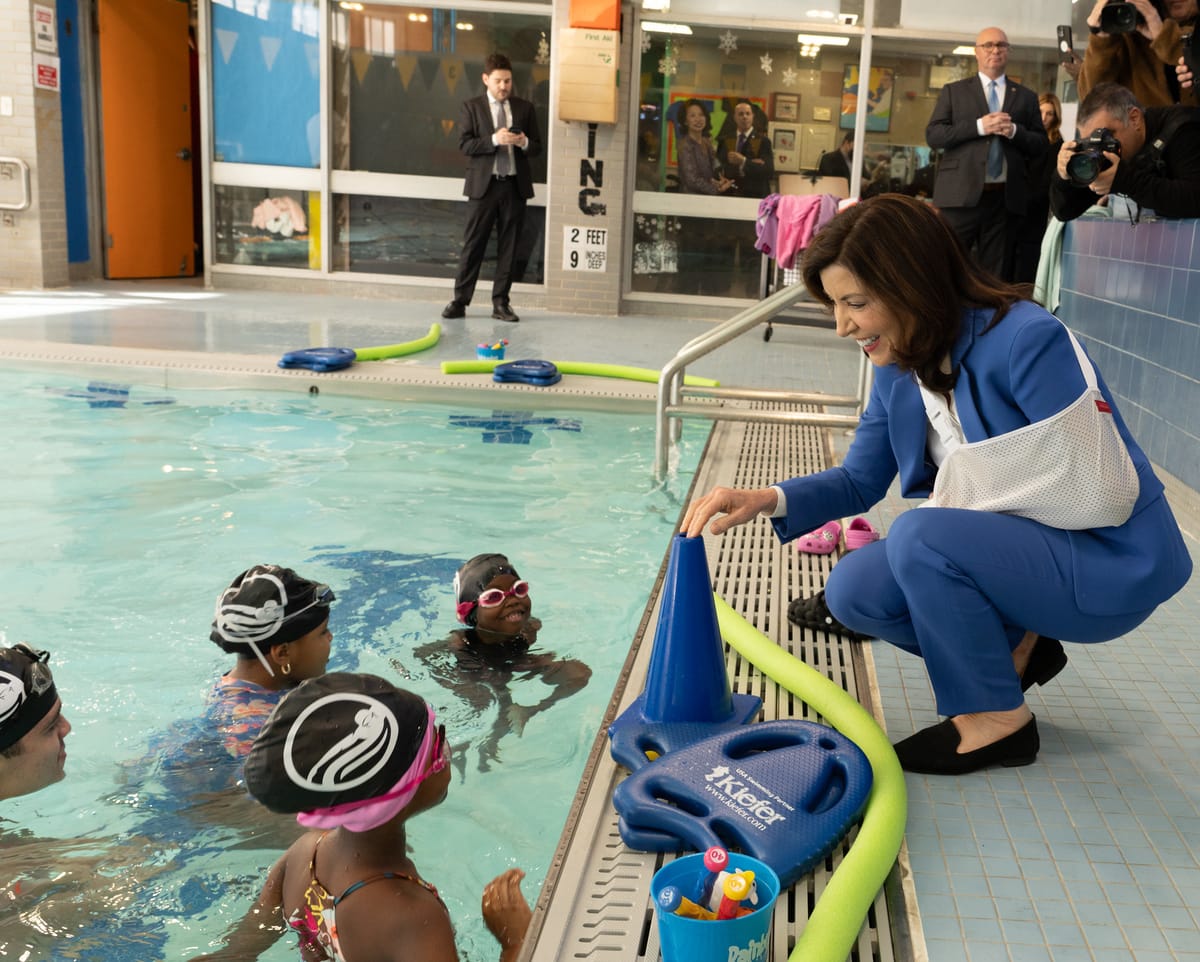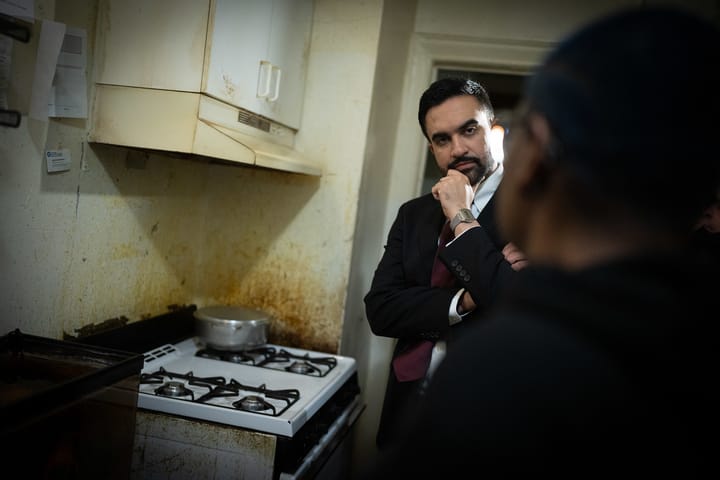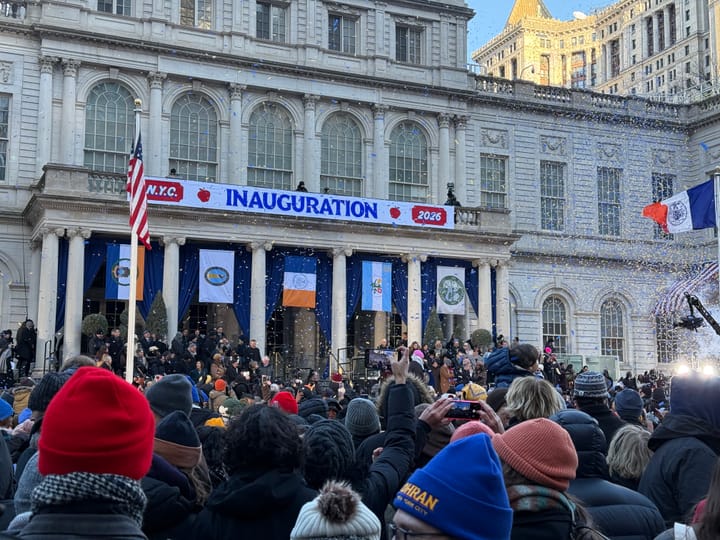A non-wonk’s guide to the State of the State address: more pools, fewer fare evasion tickets
We pulled the 12 most important things you need to know from Gov. Hochul's big speech this week.

Gov. Kathy Hochul delivered the 2024 State of the State Address on Tuesday, and if you’re still a little gun shy about tuning into gubernatorial press conferences, or missed it for other reasons that aren’t related to Covid-era trauma, you’re in luck: we waded through the speechifying and political jargon to bring you the marquee items that’ll actually affect New Yorkers’ day-to-day lives in the coming year — we’re talking pools, liquor licenses, the climate crisis, affordable housing, feeble attempts to keep cars from killing us all, and more:
Liquor license applications
It sucks to run a small business in New York City, as any number of bars and restaurants that shuttered over the past year can tell you. One of the reasons is the many forms of red tape that lead to a lot of hurry-up-and-wait problems. Hochul said she wants to fix at least one part of that: the time that bars, restaurants and others have to wait for a liquor license approval. Some bars say they wait up to a year for approval, forcing them to pay rent on a space without the benefit of alcohol sales. Hochul wants to clear the backlog — 6,000 applications currently, she said. And then she wants to create a process to approve “minimally complex” applications more quickly. The rent is still too damn high, but at least you can sell highballs faster.
A pool at your block party?
New York City has a swimming problem. Not only do many neighborhoods not even have access to public pools, many people in our archipelago city never learned how to swim. The latter becomes even more of a problem with the city facing ongoing lifeguard shortages.
Hochul wants to address all three of these issues.
You may have heard last week that the +Pool is back from the 2010s like an old pair of American Apparel shorts you found in the back of the closet. The decade-old idea to put a floating pool in the East River is just part of Hochul’s plan to increase chances to cool off on our rapidly-warming, it’s-the-coldest-summer-of-the-rest-of-your-life planet.
This week’s speech called for funding more pop-up and mobile pools (like the one that used to live at Brooklyn Bridge Park) as well as smaller mobile pools that can “sit on street surfaces” or be “dispatched to block parties, parks, events or open spaces.” So, a pool mobile?
The governor’s office is calling it “a program of pool construction unrivaled since the New Deal,” when the city opened 11 pools in one summer alone. The plan calls for 10 public pools in underserved communities, $60 million for floating pools to “inspire new engagement with our waterways” and $30 million for the pop-up pools.
To fix the lifeguard shortage, Hochul wants to start a grant program that will reimburse cities for lifeguard compensation. She also said the state would partner with SUNY campuses to get more kids into swimming lessons. We might not have enough SUNY campuses in the city for everyone to get swim lessons, but separately, groups like the Swim Strong Foundation are trying to expand swimming lessons themselves.
More air conditioners for all
High-heat days are a growing problem in schools, and could lead to more absences, Hochul said. She wants to expand funding for more cooling systems in schools — which are also used as public cooling centers in the summers — along with improved air filtration systems to handle things like wildfire smoke. This would be good news to a teacher friend of ours, who asked all of last year for the air conditioner in their classroom to be replaced, only to finally have it done in October. You might have thought we mastered the need for better air circulation during the multi year respiratory air pandemic, but apparently not.
Hochul also wants the Department of Health to add funds to help purchase, deliver and install air conditioners for people who suffer from asthma in the heat.
More trees
Hochul said she wants to plant 25 million trees across the state in the next decade. Pfft, why wait, go get one now!
Offering nursing mothers the bare minimum
The governor wants to make sure nursing mothers in the workplace get paid breaks to pump milk or feed their baby on the clock. She wants all such breaks under 20 minutes to be paid. If you’re making an employee clock out for 20 minutes to pump breast milk, you should already be in jail?
Floods and extreme weather
Boy seems like a lot of this is related to our doomed planet eh? Maybe a good time to go speak up in favor of congestion pricing (LINK TK). The governor talked about ever-rising flood risks facing the city, with an anticipated 302 percent increase in property losses due to storm damage over the next 30 years. The governor proposed a “Resilient & Ready Program” to help low- and moderate-income homeowners make repairs and cover the costs of flood mitigation measures. In October, we wrote about how one Queens neighborhood has been fretting about floods even on moderately rainy days.
However, preparations can only go so far to protect people when the sea is angry and hungry to eat some land, which seems like something that will keep happening. Hochul wants to create a Blue Buffers voluntary buyout program to get the buy the most vulnerable people out of the flood areas all together.
Fighting “organized retail theft”
It’s not a thing. Next.
Affordable housing, maybe this time?
2023’s affordable housing initiatives are pretty widely understood to have been a failure, as an ever-growing number of New Yorkers struggle to afford to actually live here. State of the State documents pointedly lay this at the feet of the legislature for failing to pass measures like a renewal or replacement of the 421-a tax incentive for developers, among other things.
In addition to the proposed reinstatement of 421-a or a similar incentive, this year’s affordable housing roadmap includes plans to uncover up to 15,000 units of available housing on various state-owned sites, proposals to allow for denser residential capacity in the city, incentives for the creation of affordable housing in office-to-residential conversions (which, by the way, is a lot more complicated than it sounds), legalization of basement apartment units (which is tricky given aforementioned flood concerns), and protections against Section 8 voucher discrimination.
A lot of these proposals are similar to ones that got stymied by legislative squabbling last year. And 2024 is a congressional election year, so the governor will be doing a dance of appeasement in the suburbs so Democrats don’t lose more seats. So we’ll see what actually shakes down this time around.
License plate crimes
Fare-beating isn’t just for subway riders: scofflaw drivers have turned license plate obfuscation into an art, doing whatever they can to avoid red-light cameras, speed cameras and toll-booth collections. It’s enough that it drove Dave’s boss into a life of vigilante un-vandalism trying to correct defaced plates. Hochul wants to put more weight behind the enforcement of illegal license plate tampering so it’s not just up to one man on a bicycle with a screwdriver. She’s proposing increasing fines for evasion, increasing toll enforcement and banning the sale of so-called “vanish plates” that retract or hide when passing a camera. She wants police to be able to seize those plates or covers too.
Lower speeds on city streets
For years, safe streets advocates have been pressing state legislators to allow New York City the authority to lower speed limits to 20 miles per hour on some streets around the city. The bill, known as Sammy’s Law, is named for Sammy Cohen Eckstein, a 12-year-old boy who was killed by a driver on Prospect Park West in 2013. The effort has run into legislative headwinds in Albany before, so this time around Hochul is proposing it in her executive budget to try to get the bill over the line.
A break for turnstile jumpers
The governor wants fare-beating to be a less onerous crime. The governor proposed allowing police officers to issue written warnings, rather than a ticket, for first time fare-evasion offenders, as well as waiving fines for first-time offenders if they enroll in the Fair Fares program (a way to stop criminalizing low-income riders). She also wants the MTA to refund up to 50 percent of the first fine – if paid on-time – to a rider in the form of a fare card. That could be just in time, as fare beating might get even easier with these new turnstiles.
Transit expansions
Hochul didn’t center mass transit funding the way she did last year with her executive budget, but she did move a couple of megaprojects forward in her speech. In Manhattan, Hochul said that the MTA would begin a feasibility study looking at whether it would be possible to expand the Second Avenue subway west along 125th Street for the third phase of the project. The extension of the Q train is still working its way up 2nd Avenue, but in a recent analysis of capital projects in its 20-Year Needs Assessment, the MTA suggested that building three stations west along 125th Street to Broadway could connect the Q to the 1, 2, 3, A, B, C and D lines and provide 240,000 daily subway trips.
Hochul also announced that the Interborough Express, the bi-borough light rail project that finally establishes a new rail connection between Kings and Queens counties, will begin its next phase, a formal design and engineering process.




Comments ()